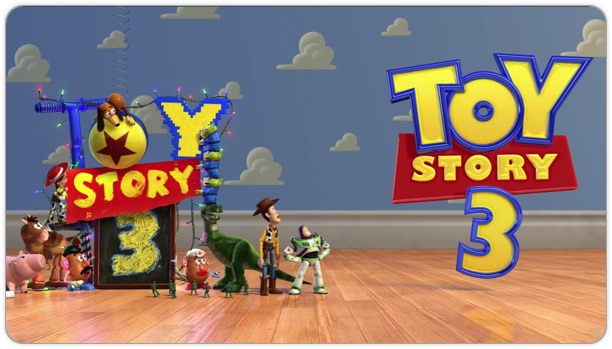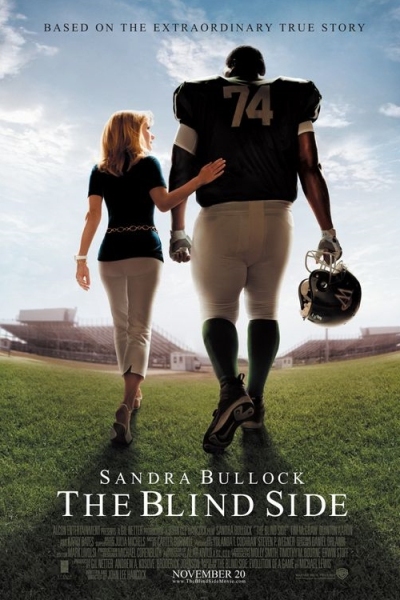Toy Story Trilogy
 Tuesday, October 26, 2010 at 7:44PM
Tuesday, October 26, 2010 at 7:44PM This wasn't the first time I was on the fence about going to see a movie in theaters, especially a Pixar film. As great as the greats are (Wall-e, Toy Story, Ratatouille) there are the less than greats (Up, Cars, Toy Story 2). Though I'm quite the Pixar fan, I have no interest in wasting my money or time. So I waited to watch Toy Story 3 in the dollar theater opting out of the 3D experience (I didn't see Up in 3D either). And after I watched the film, as is our custom, my brother and I dove right into a rich conversation.

I wish I had a crew of audio engineers following me around for moments like that. Truly, what we discuss off the tops of our heads about films or video games goes far beyond the kind of stuff other's revise and publish as critique, commentary, or analysis. In this case, we talked about Toy Story 3 for days, but really it was a discussion on Toy Story as a trilogy.

Some of the topics we discussed include:
- The change in technology over the years in the visual presentation (look and animation) of the toys and how that in turn shapes the characterization in terms of "living toys."
- The driving premise/conceit of living toys and how it is complicated when issues of ownership, allegiance, play, life, and death are brought into the narrative for toys and for humans.
- Pixar's finest vilians are never evil for the sake of being evil (ie. mindless, carelessly illogical, and souless). Sid (TS1) is a great villian. The Prospector (TS2) is more forced with a more hollywood movie trope like secret agenda. And Lotso (TS3) was the least complex and least interesting. Lotso cheats the most to further the plot. Not pushing the stop button to safe Woody and the gang is a powerful action that wasn't well developed at all. Seriously, a simple disagreement in ideas is worth killing over?
- The trend throughout the newer movies of relying on familiar and cliche movie tropes to develop characters, scene, and plot. This fundamentally changes the core storytelling of the films.
- Toy on Toy violence. Should it mean anything for a Toy to threaten another with punches and kicks?
- Toys with lives of their own. In the later movies, the toys become more like human characters (especially with the increasing reliance on more familiar movie tropes from more realistic dramas). Toys play games while the humans are away. Does this work to unravel the original conceit?
- The social order of the toy communities are centered around humans/owners. How does the idea of being in a museum display or the toy store (TS2) work against these patterns.
- Pixar is known for their clever polar character twists. Rex the fierce Dinosaur is actually quite shy. The sharks from Nemo didn't eat fish. Also, it's common in sequels to take the structures and formulas of the first movie and apply a twist to the whole structure. Does the role reversal of Woody save Buzz (TS1) and Buzz saving Woody (TS2) work against the character development from TS1?
- Are the toy's personalities/souls the result of the imaginative play of Any? Mr. Potato head and Ham are skeptical and sardonic. Woody is trustworthy. Bo is a voice of reason that's backgrounded. Is the idea of play a subtle instrumental part of the entire Toy Story framework?
- The Buzz factor. In the first movie Buzz adjusts to a life as Andy's toy from his electronic "programmed" memories. In TS2, a new "Buzz" is worked into the plot to have similar interactions without messing with Buzz's character direction. In TS3, Buzz is tampered with twice. Are toy souls/personalities such things that are so easily manipulated. I don't believe that Buzz's real memories with Any can take a back seat to any further electronic manipulation.
- The souls of Mr./Mrs Potato head are in their parts not in their brown potato bodies. Neat.
- The later films are far more expository in their dialog instead of using visual storytelling and cleverly constructed scenarios to explain and further the plot.
- TS3 features a scene where the toys sort of come to grips with their impending deaths. Did the first movie do a more subtle and elegant job of this?
- Toys trekking through the real world. TS1 framed the plot around the small scale of toys. Getting to places (even from house to house) is a big task. Is this idea cheapened in TS2 and TS3 when the toys seem so capable of traveling around the world on their own? Lotso and friends hitching a ride on the back of a car and then walking through the rain is past what I'm willing to accept.
- Characters that fail to listen after all this time? In the 2nd and 3rd movie, it seems like the toys fail to take the time and listen to Woody especially when decision making is critical. I don't think there's enough evidence to consider that these toys are in a state of arrested development. So why does it feel like they're rushed into the core plot/conflicts of the film (TS3).
- Can toys be evil? Can kids be evil? In TS1 we learned that even the most abused, hideously dismembered/rearranged toys are quite the opposite of violence creatures.
- Might some consider Woody telling Sid to "play nice" in TS1 crossing the line? If not, why aren't the toys more willing to do so in later films?
- The rules of being a toy are unstated, but they seem to include playing "dead" when humans are nearby unless you can get by unnoticed. Are the toy's separate lives and activities too risky of being discovered? How much can they actually get away with?
- Are we to believe that the daycare and garbage facility in TS3 are just open to be manipulated by the toys without having any detectable side effects? How about the Toys store from TS2? This is pushing things too far.
- The aliens in TS3 wouldn't be able to see the toys as they neared the incinerator.
- The toys are "alive" but do they feel pain? Can Buzz really smell (TS3)? In TS1 was Woody in pain for being burned by Sid's magnifying glass, or was he more startled, fearing his worth as a toy being compromised.
- The toys are too strong by the 3rd movie. Perhaps the big baby could do certain things, but not Woody and the other smaller toys. Too many windows, ceiling tiles, doors, and lids were opened/closed.
- The ending of TS3 is too long and disjointed. It includes the escape, the dump, the reboxing, and the giving away. Do we really need Any to explain each Toy's name and personality by the 3rd movie especially after the more imaginative opening play scene?
- Is the story of TS2 and TS3 dumbed down in the sense that they fail to make any truly difficult/complex decisions because of the overly evil vilians and mostly clear cut scenarios?
- The nostalgia buttons were pressed when they played the "You've Got a Friend In Me" music from TS1 in TS3. Fortunately, the used that to transition into the new reality to kick start the film.
I was disappointed with Toy Story 3 for many reasons. It's better than Toy Story 2 though. Overall, because of the rich discussion that followed and all of the other topics/ideas that are swirling in my mind, I hold the trilogy in high regard. This makes the film worth it for me. I can't wait to watch it in 3D on my 3DS.


